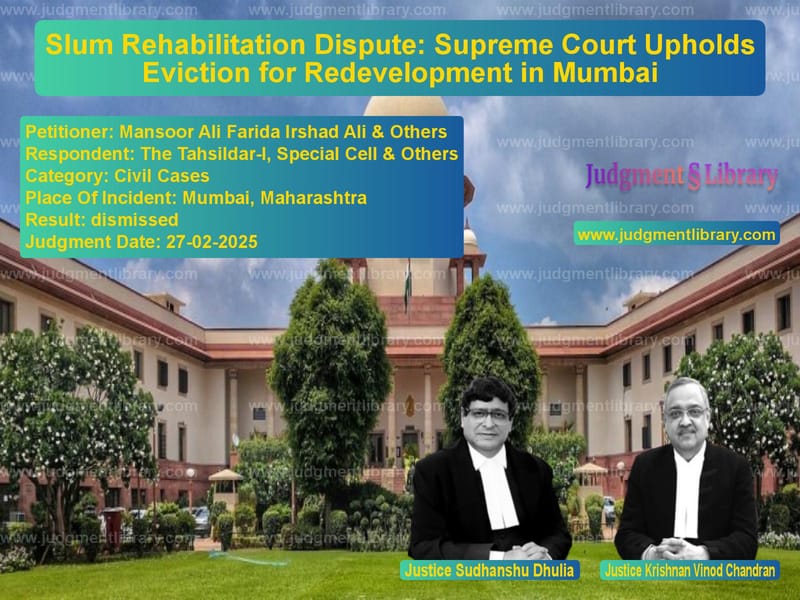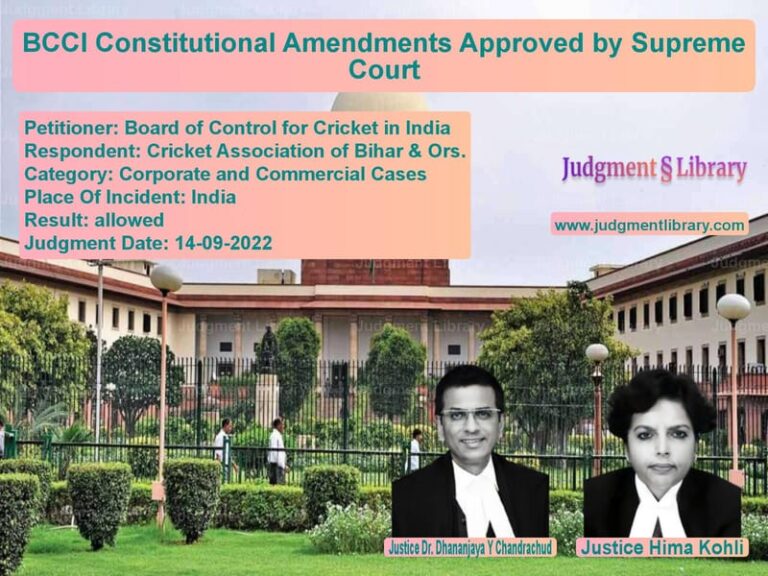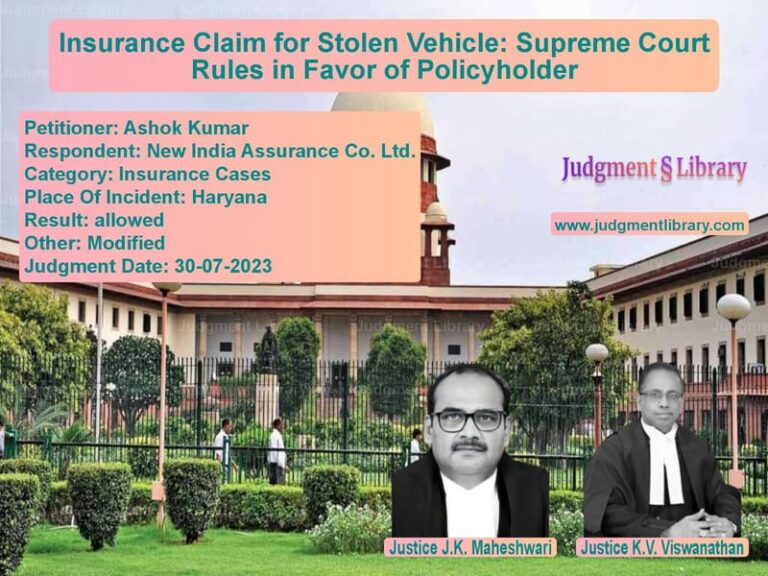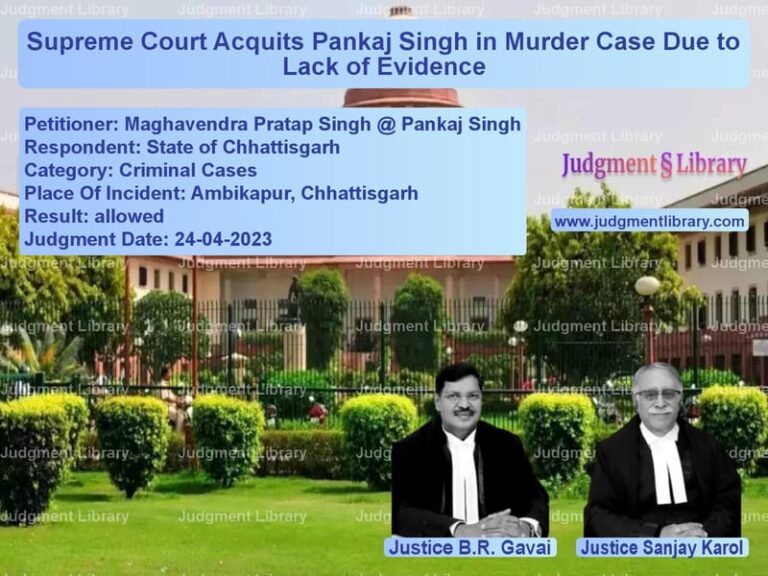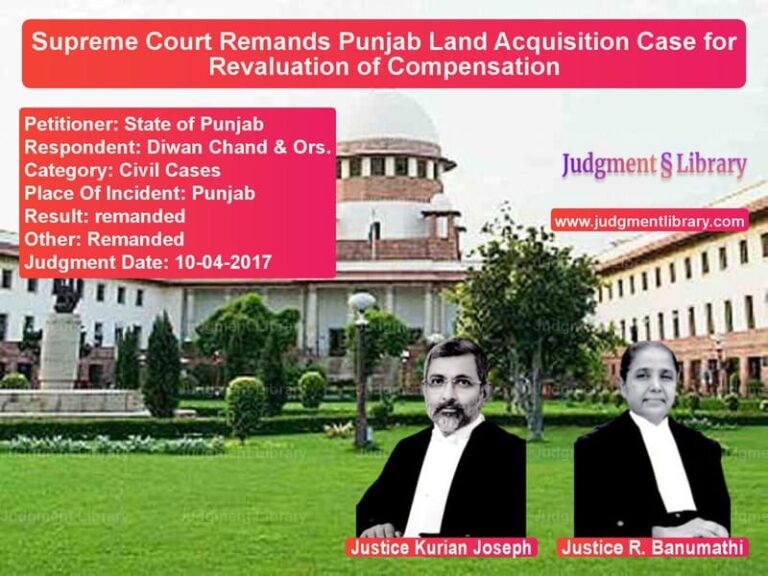Slum Rehabilitation Dispute: Supreme Court Upholds Eviction for Redevelopment in Mumbai
The case of Mansoor Ali Farida Irshad Ali & Others vs. The Tahsildar-I, Special Cell & Others is a landmark ruling concerning the redevelopment of slum areas under the Maharashtra Slum Areas (Improvement, Clearance, and Redevelopment) Act, 1971. The Supreme Court upheld the eviction of the appellants, who challenged the redevelopment project, ruling that their objections were without merit.
Background of the Case
The appellants were residents of a slum area in Mumbai designated for redevelopment. The Slum Rehabilitation Authority (SRA) had issued eviction notices, instructing them to vacate the premises so that the land could be redeveloped under a sanctioned Slum Rehabilitation Scheme.
The key timeline of events is as follows:
- 2010: SRA sanctioned a slum rehabilitation scheme and appointed a developer for the project.
- 2019 (January 28): SRA issued a notice under Sections 33 and 38 of the Slum Act, directing slum occupants to vacate the premises.
- 2019 (June 12): The Apex Grievance Redressal Committee (AGRC) dismissed the challenge to the notice.
- 2022 (December 6): SRA issued a second notice, again directing eviction within 48 hours.
- 2023 (January 4): The Bombay High Court dismissed the appellants’ writ petition challenging the eviction notice.
- 2025 (February 27): The Supreme Court upheld the High Court’s ruling and dismissed the appeals.
Petitioners’ Arguments (Slum Residents)
The residents who challenged the eviction put forward the following arguments:
- The land was part of a MHADA layout, and only MHADA, not SRA, had the authority to redevelop it.
- The slum rehabilitation scheme lacked mandatory consent from 70% of the eligible slum dwellers.
- The area had not been officially declared a slum under the Slum Act, and therefore, SRA could not enforce eviction.
- Their status as MHADA tenants granted them different rights from ordinary slum dwellers.
- The redevelopment project was being carried out in bad faith and without due process.
Respondent’s Arguments (Slum Rehabilitation Authority & Developer)
The SRA, along with the developer and the cooperative society involved in the rehabilitation project, argued that:
- The plot was indeed a censused slum from 1981 and fell under Regulation 33(10) of the Development Control Regulations (DCR), making it eligible for SRA-led redevelopment.
- MHADA had granted a No Objection Certificate (NOC) for redevelopment under SRA.
- The project had already been implemented in two phases, with 2625 out of 2965 slum structures being successfully rehabilitated.
- The challenge to the 2019 AGRC decision was never pursued by the petitioners, and the order had attained finality.
- The appellants had used dilatory tactics to delay the project, harming the interests of other eligible slum dwellers.
Supreme Court’s Observations
The Supreme Court examined the facts and legal provisions, making the following key observations:
- Legality of Slum Redevelopment: The project was lawfully sanctioned under the Slum Act, and the appellants had no grounds to challenge it.
- Consent of Slum Dwellers: Over 70% of eligible slum dwellers had approved the scheme, meeting the legal requirement.
- Finality of AGRC’s Decision: The petitioners did not challenge the 2019 AGRC ruling in time, and their arguments were therefore barred by law.
- MHADA’s Role: The argument that the land should be redeveloped under Regulation 33(5) instead of 33(10) was baseless, as MHADA itself had cleared the SRA-led project.
- Deliberate Delay: The appellants had engaged in delaying tactics, harming other slum dwellers who were already rehabilitated.
Final Judgment
The Supreme Court:
- Dismissed the appeals filed by the slum residents.
- Held that the redevelopment project was legal and valid.
- Directed that all interim orders be vacated, allowing eviction and redevelopment to proceed.
The Supreme Court ruled:
“The appellants have only been using dilatory tactics to delay the project. This redevelopment, which is being carried out under the Slum Act and Regulation 33(10) of DCR, does not suffer from any legal infirmity.”
Conclusion
This ruling reinforces the legal framework governing slum redevelopment in Mumbai. It affirms that once a project is approved with the required majority consent, individual objections cannot be used to stall progress indefinitely. The judgment serves as a precedent for future disputes in urban development and housing laws, ensuring that redevelopment projects meant for public benefit are not unfairly delayed.
Petitioner Name: Mansoor Ali Farida Irshad Ali & Others.Respondent Name: The Tahsildar-I, Special Cell & Others.Judgment By: Justice Sudhanshu Dhulia, Justice Krishnan Vinod Chandran.Place Of Incident: Mumbai, Maharashtra.Judgment Date: 27-02-2025.
Don’t miss out on the full details! Download the complete judgment in PDF format below and gain valuable insights instantly!
Download Judgment: mansoor-ali-farida-i-vs-the-tahsildar-i,-spe-supreme-court-of-india-judgment-dated-27-02-2025.pdf
Directly Download Judgment: Directly download this Judgment
See all petitions in Property Disputes
See all petitions in Landlord-Tenant Disputes
See all petitions in Judgment by Sudhanshu Dhulia
See all petitions in Judgment by K. Vinod Chandran
See all petitions in dismissed
See all petitions in supreme court of India judgments February 2025
See all petitions in 2025 judgments
See all posts in Civil Cases Category
See all allowed petitions in Civil Cases Category
See all Dismissed petitions in Civil Cases Category
See all partially allowed petitions in Civil Cases Category

